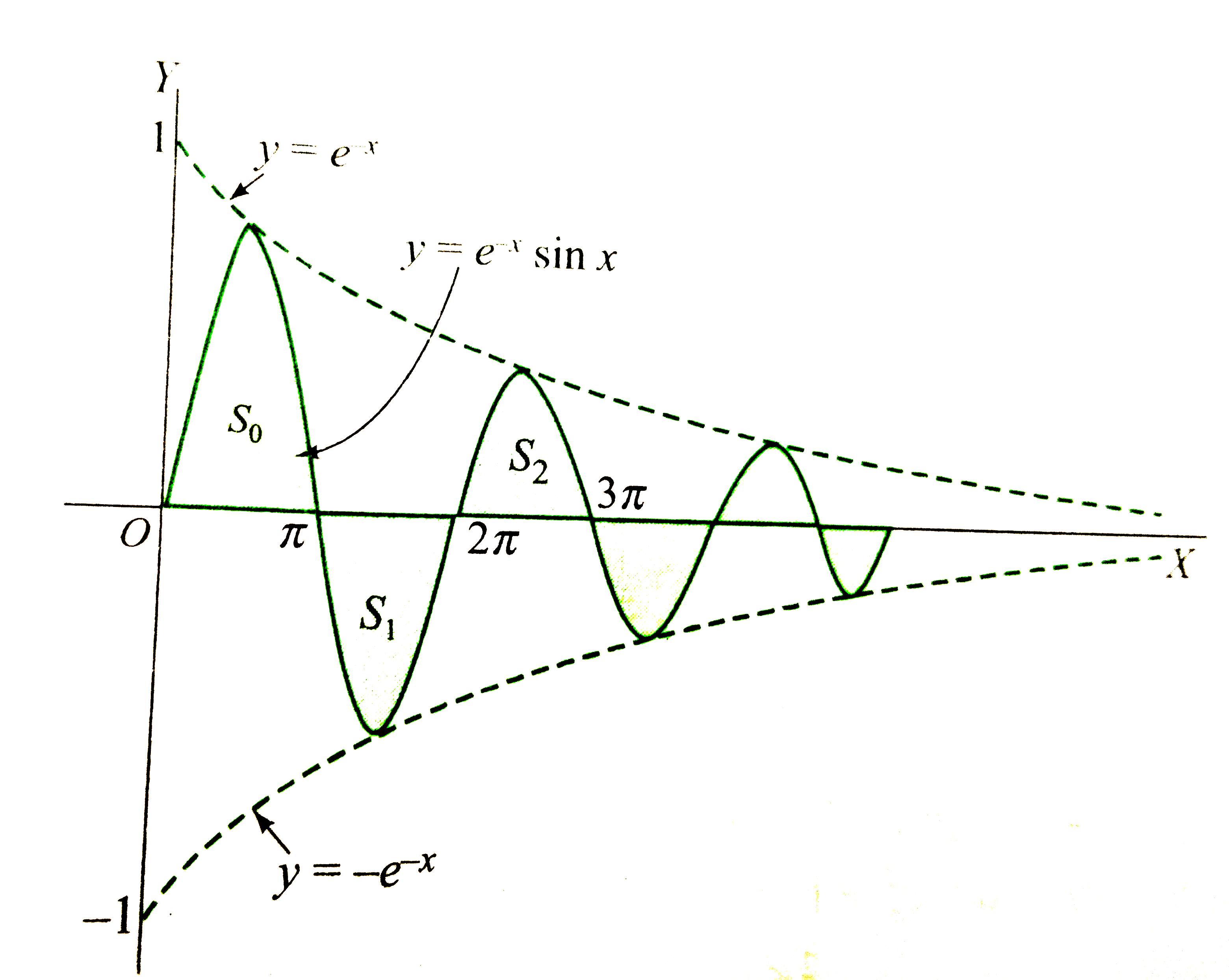Consider the area S0,S1,S2…. bounded by the x-axis and half-waves of the curve y=e−xsinx, where x≥0.
Σ∞n=0Sn is equal to
1+eπ1−e−π
12(1+eπ)1−eπ
12(1−e−π)
None of these
The correct Answer is:B
Since −1≤sinx≤1, the curve y=e−xsinx is bounded by the curve y=e−xandy=e−x.

Also, the curve y=e−xsinx intersects the positive semi-axis OX at the points where sin x=0, where xn=nπ,n∈Z.
Also |yn|=|y coordinate in the half-wave Sn|
∴ Sn=(−1)n(n+1)π∫nπe−xsinxdx
=(−1)n+12[e−x(−sinx+cosx)](n+1)πnπ
=(−1)n+12[e−(n+1)x(−1)n+1−enπ(−1)n]
=e−nπ2(1+eπ)
⇒ Sn+1Sn=e−π
and S0=12(1+eπ).
Therefore, the sequence S0,S1,S2,... forms an infinite G.P. with common ratio e−π. we have
∞Σn=0Sn=12(1+eπ)1−e−π
Topper's Solved these Questions
- AREABOOK - CENGAGECHAPTER - AREAEXERCISE - Exercise (Matrix)
4 Videos
- AREABOOK - CENGAGECHAPTER - AREAEXERCISE - Exercise (Numerical)
16 Videos
- AREABOOK - CENGAGECHAPTER - AREAEXERCISE - Exercise (Multiple)
10 Videos
- APPLICATIONS OF DERIVATIVESBOOK - CENGAGECHAPTER - APPLICATIONS OF DERIVATIVESEXERCISE - Question Bank
29 Videos
- AREA UNDER CURVESBOOK - CENGAGECHAPTER - AREA UNDER CURVESEXERCISE - Question Bank
20 Videos
Similar Questions
Prove that the areas S0,S1,S2,.S2,.S3,….., bounded by the x-axis and half-waves o the curve y=e−αxsinβx,x≥0, from a geometric progression with the common ratio q=(eαxβ)
View SolutionProve that the areas S0,S1,S2...bounded by the X-axis and half-waves of the curve y=e−axsinβx,x∣0.from a geometric progression with the common ratio g=e−πα/β.
View Solution
Knowledge Check
Consider the area S0,S1,S2…. bounded by the x-axis and half-waves of the curve y=e−xsinx, where x≥0.
The value of S0 isA12(1+eπ) sq. unitsB12(1+e−π) sq. unitsC12(1−e−π) sq. unitsD12(eπ−1) sq. unitsFor j=0,1,2…n let Sj be the area of region bounded by the x-axis and the curve yex=sinx for jπ≤x≤(j+1)π
The value of ∞∑j=0Sj equals to :Aex(1+ex)2(eπ−1)B1+eπ2(eπ−1)C1+eπeπ−1Deπ(1+eπ)(eπ−1)For j=0,1,2…n let Sj be the area of region bounded by the x-axis and the curve yex=sinx for jπ≤x≤(j+1)π
The ratio S2009S2010 equals :Ae−xBeπC12exD2eπ
Find the area bounded by the y-axis and the curve x=eysinπy,y=0,y=1.
View SolutionFind the area bounded by the curve y=cosx, x-axis and the ordinates x=0 and x=2π.
View SolutionFor j=0,1,2…n let Sj be the area of region bounded by the x-axis and the curve yex=sinx for fπ≤x≤(j+1)π
The value of So is :
View SolutionThe area bounded by the curve y=sin2x−2sinx and the x-axis, where x∈[0,2π], is
View SolutionArea bounded by the curve y=e−x, the X-axis and the lines x = 0, x = 1 is
View Solution
